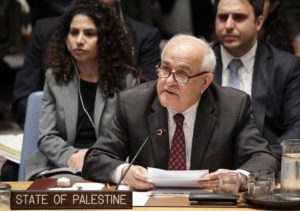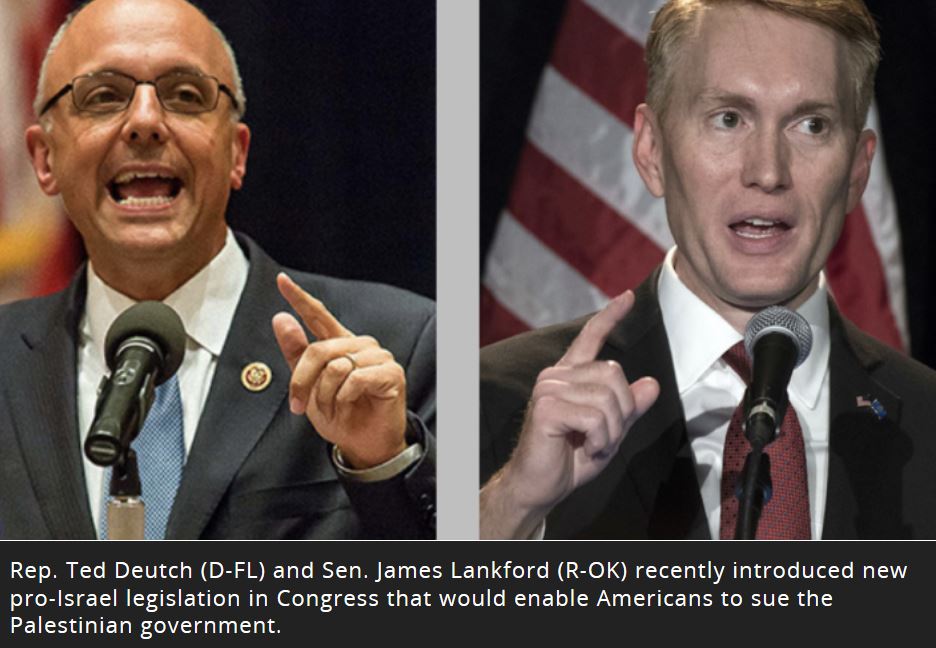New legislation introduced in Congress would potentially destroy the ability of the Palestinian leadership to engage in diplomatic and legal channels to support Palestinian national aspirations. The legislation would give Palestinian leaders two options: withdraw from international bodies that are integral to their pursuit of justice or be held liable for actions they didn’t commit, potentially resulting in the government’s eventual bankruptcy and demise.
by Kathryn Shihadah
In addition to the roughly two dozen Israel-related bills in various stages currently before Congress, new legislation would open the Palestinian Authority (PA) to disastrous lawsuits and quash any hopes of a negotiated settlement with Israel. The PA has its share of corruption, as it attempts the impossible task of ruling while under the thumb of Israeli occupation. Nevertheless, analysts say that a dissolution of the Palestinian government through U.S. legislation could be catastrophic.
Current legislation promoted by segments of the Israel lobby would do just that.
The latest bipartisan legislation would enable American victims of political violence in Israel to work through the American court system to collect damages from the Palestinian government. (Notably, it would not afford American victims of Israeli violence, such as this 16-year-old, the same opportunity.)
The legislation is the latest in a string of attempts to extract huge sums of money from the Palestinian government for violence perpetrated by individuals acting alone. Previous rulings declared such lawsuits outside US jurisdiction. (Iran has also been targeted.)
Current legislation: “Promoting Security and Justice for Victims of Terrorism Act of 2019”
H.R.1837 (and its twin S.2132) is written in such a way that, in the words of human rights attorney Zaha Hassan, undermines “the ability of the Palestine Liberation Organization (PLO) to engage diplomatic and legal channels to support Palestinian national aspirations and to seek accountability through international mechanisms.”
She writes that this would result in “the end of a Palestinian negotiating partner for any future peace talks.”
In addition, Hassan points out, this would severely impact the international effort on behalf of justice for Palestinians.
She writes: “Many Palestinians and those in the solidarity community may not fully appreciate how the international delegitimization or bankrupting of the PLO – the body still recognized as the sole legitimate representative of the Palestinian people – could impact their human rights advocacy in the US and globally. Whatever one’s views about the PLO or PA, no longer having an address for the national aspirations of the Palestinian people will make international and US advocacy much more difficult.”
The legislation seeks to impose US court jurisdiction on Palestine so that American citizens (and their lawyers) can target the Palestine Liberation Organization (PLO) and the Palestinian Authority (PA) with lawsuits for suicide attacks in the early 2000s.
(Note that Palestinian suicide bombings killed far fewer civilians than Israeli bombings of Palestinians; see stats here and here. Additional info about suicide bombings is here, here, and here.)
Given the anti-Palestinian sentiment within some US courts (discussed below), it is likely that the PA would be found liable and face crippling fines – in spite of its lack of involvement in the incidents.
To escape certain bankruptcy, Palestine would need to resign from institutions that give it legitimacy in the world, such as its memberships in UNESCO and the International Criminal Court. (It has full membership in two additional international agencies, and observer status in six).
The loss of such memberships would be extremely damaging. For example, stepping down from membership in the International Criminal Court would bar Palestine from pursuing war crimes claims against Israel.
(That being said, many in the activist community believe that while the UN and ICC are vital components of justice for Palestinians, grassroots advocacy from American citizens is at least equally as important, as the US bankrolls and defends Israel’s actions.)
Under the new legislation, Palestine would be able to remain a member of the UN General Assembly (as a nonvoting observer) and maintain an office in the US for official UN business, but anything more would amount to “consent to jurisdiction,” and Palestine would be vulnerable to lawsuits.
There is already one court case in the US that could be devastating.
A past lawsuit against the PLO, was eventually decided in Palestine’s favor, but this would likely change if the new legislation goes through.
Initially, New York Judge George Daniels ordered the Palestinian government to pay over $650 million in damages for its alleged part in suicide attacks (more below), but an appeals court then dismissed the case. Under the new legislation, the verdict would likely be reinstated.
Such lawsuits could cause the PA eventually to go bankrupt. In addition, the PA would officially be equated with a terrorist organization, even though it had no connection with the violence.
This punishing and unjust Catch-22 situation would be imposed on a people already dealing with illegal occupation and blockade.
[To contact your Congress members about the legislation, go here.]
Congress’ double standard
As pro-Israel lawmakers lay this trap for Palestine, US laws are already on the books – for example, the Leahy Laws – that require limiting aid to countries practicing Gross Human Rights Violations (GHRV). These laws, however, have never been applied to Israel – in spite of its well-documented history of human rights violations (for example, see this, this, and this).

Another legislative irony lies in the fact that the new law would seek to hold the Palestinian government responsible for rogue members of its community whose acts the leadership roundly condemned; meanwhile refusing to hold the government of Israel responsible for illegal and immoral acts that the Israeli government and military openly and officially perpetrate.
Human Rights Watch lists five main categories of human rights abuses by Israel, all of which have been chronicled for decades: unlawful killings; forced displacement; abusive detention; the closure of the Gaza Strip and other unjustified restrictions on movement; and the development of settlements, along with the accompanying discriminatory policies that disadvantage Palestinians.
Additionally, Congress is entertaining legislation that could potentially strip Americans of their First Amendment rights, in order to protect Israel from criticism and from economic ramifications for its policies that contravene international law.
US jurisprudence reveals yet another double standard in the issue of Americans who have been killed or injured by Israeli troops, and have been unable to find justice.
Rachel Corrie was one of several American citizens killed while peacefully protesting in Israel; after twelve years of litigation, Israel cleared itself of wrongdoing; a court case in the US was dismissed due to lack of jurisdiction. Emily Henoschowitz is an Israeli-American who lost an eye due to Israeli military violence. Israel never compensated her. US citizen Tariq Abu Khdeir’s severe beating by an Israeli officer was video taped; the officer was later sentenced to only 45 days of community service and a suspended prison term of four months.
The most dramatic example of Americans killed by Israel – and then denied justice – is the USS Liberty.

On June 8, 1967, 34 American servicemen were killed and 174 were wounded when Israeli warplanes and torpedo boats attacked the clearly-marked Navy ship, the USS Liberty. An independent commission led by four-star Admiral Thomas Moorer found that the Israeli attack constituted “an act of war” against the US, and stated: “There is compelling evidence that Israel’s attack was a deliberate attempt to destroy an American ship and kill her entire crew.” Yet, Israel has never been held to account for its lethal actions against American servicemen (and US media have largely buried the facts).
These are just a handful of the many wrongdoings on the part of Israel that have gone unacknowledged, excused, or unpunished by the US court system; meanwhile Congress seeks to castigate the government of Palestine for the actions of Palestinians operating outside its authority.
Billions to Israel, standard conditions waived
The House version of the bill currently under consideration contains some troubling assertions that deserve a close look.
• The section of the legislation entitled, “Security Assistance for Israel,” makes into law the US MOU to provide Israel $38 billion over the next 10 years – an amount that the majority of Americans consider excessive.
• The bill also states that Israel is eligible for special treatment – specifically, a waiver of licensing requirements for weapons exports. The expressed reason for the waiver is Congress’ “findings” that “Israel has adopted high standards in the field of export controls” and that Israel is a signatory to “the Protocol for the Prohibition of the Use in War of Asphyxiating, Poisonous or Other Gases, and of Bacteriological Methods of Warfare.”
• It also waives the Arms Export Control Act whenever Israel informs the US that it is “under an existing or imminent threat of military attack.” At this point the President may grant “immediate transfer” of whatever Israel needs, in amounts “not subject to any limitation.” This waiver is spelled out in spite of Israel’s frequent violations – or perhaps because of them (see this and this).

These waivers are deeply problematic. In fact, as reported by Israeli newspaper Ha’aretz, Israel routinely sells weapons to human rights abusers, including South Sudan, Myanmar, and Sri Lanka (Israel also sold to South Africa during its Apartheid era). In addition, Human Rights Watch and Amnesty International revealed that Israel used white phosphorus in crowded civilian areas during its 2008-2009 incursion into Gaza – a charge which Israel at first denied, but later acknowledged.
Although Israel’s weapons sales and its use of chemical weapons are well-known, Congress insists that Israel deserves favored status in the sharing of US munitions.
About the sponsors of the bills
Rep. Ted Deutch (D-FL), who initiated the House version of the bill, has received $613,041 in campaign contributions from pro-Israel organizations during his ten years in office, and has taken five AIPAC-sponsored trips to Israel. In 2109 alone, he introduced H.R.1837, the US-Israel Cooperation Enhancement and Regional Security Act; denounced boycott of Israel; and criticized Gazan rockets but not Israeli sniper killings of unarmed demonstrators. Deutch serves as Chairman of Middle East, North Africa, Int’l Terrorism Subcommittee.
Sen. James Lankford (R-OK), has been an outspoken supporter of Israel before he introduced S.2132. In 2014, he condemned boycotts; in 2015 he spoke at the AIPAC policy conference, and when Israeli PM Netanyahu came to Capitol Hill without a presidential invitation, Lankford welcomed him warmly; he discouraged a change in EU labelling laws for “certain products made by Israeli companies”; in 2018 he supported Trump’s recognition of Jerusalem as Israel’s capital. On Lankford’s official website, he criticizes Obama’s occasional “inexplicable deference to the Palestinians.”

Palestine at the UN
Because the US and Israel – two critical entities in the quest for self-determination – insist that Palestine has no legitimacy, Palestine has for several years pursued legitimacy in the global arena.
The State of Palestine began pursuing membership in the UN and its agencies in 2011, after President Obama’s target date for a two-state solution had come and gone.
“The Quartet” (the US, the EU, Russia, and the UN) had not managed to negotiate a two-state solution. Abbas explained that Israel was responsible for the failure, noting that settlement building, the ongoing blockade of Gaza, and other policies
are unilateral actions and are not based on any earlier agreements. Indeed, what we witness is a selective application of the agreements aimed at perpetuating the occupation…the Israeli government refuses to commit to terms of reference for the negotiations that are based on international law and United Nations resolutions.
At that point, with no solution in sight, Palestinian leaders embarked on a different path to statehood: seeking recognition from individual countries. The effort met with relative success: the UN General Assembly voted 138-9 (with 41 abstentions) to grant Palestine non-Member Observer State status, a move that Israeli PM Netanyahu’s office called “a meaningless decision.”
138 countries recognize the state of Palestine
Still, this upgrade is widely considered “de facto recognition of the sovereign state of Palestine.” Since then, 138 out of the 193 UN member states and two non-member states have recognized the state of Palestine. In other words, 71.5 percent of the UN member countries officially consider Palestine a country.
In 2015, the State of Palestine became a member of the International Criminal Court (ICC), which gave the court jurisdiction over the Israel’s 2014 incursion into Gaza – in which 2,250 Palestinians and 73 Israelis were killed.
The US has not recognized the State of Palestine, but has referred to the “Palestinian territories” – until recently. The US State Department has removed Palestine from its list of countries and regions. It is unclear why this occurred or whether it will be changed. As of today, there is no mention of Palestine, Palestinian, Occupied Territories, West Bank, or Gaza in the State Department’s list of “Countries and Areas.”
Attacks against Palestine’s economy and legitimacy are nothing new.
First attempt to extort money from the PA
The US State Department explains that until the 20th century, immunity of a state from jurisdiction of another state was “an undisputed principle of customary international law [that] seemed to have no exceptions.” When governments began engaging in commerce, however, a more “restrictive theory” of immunity began to develop; the US officially enshrined this into law, gradually refining the legislation to make foreign states’ funds more accessible.
The 1976 Foreign Sovereign Immunities Act (FSIA) and the Antiterrorism and Effective Death Penalty Act of 1996 (AEDPA) defined protection for sovereign nations against lawsuits by US citizens. A “terrorism exception” enabled action against those states that were designated state sponsors of terrorism.
2015: Israeli NGO v. PLO wins then loses
In 2015, an Israeli NGO represented ten Americans whose family members had been killed or injured during suicide bombings in 2002-2004 in Israel. The organization, Shurat HaDin (which has acted as a proxy for Mossad – Israel’s CIA), alleged in Sokolow et al v. Palestine Liberation Organization et al that the Palestinian Authority (PA) and the Palestine Liberation Organization (PLO) had participated in the plots.
Shurat HaDin won the suit, and the families were awarded over $650 million.
Michael Ratner, former president of the Center for Constitutional Rights, said at the time of the verdict, “the trial was a concrete demonstration of this country, the United States’ utter hypocrisy on the issue of who gets justice…The courts in our country, in the United States, will bend over backwards to hold Palestine liable.”
Ratner pointed to three cases he had tried – and lost – on behalf of Americans killed by Israel. In the Rachel Corrie case, he was up against a US president who could “authorize gross violations of human rights, especially by Israel, and a court will look the other way…[as Israel commits] war crimes.”
He continued,
And if they can’t, if for some reason the law says you can’t do that, then who will step in here? Our Congress will step in. And as they did here, it will pass laws and statutes that give the courts laws that allow people in the United States, citizens, to sue Palestinians. But those laws will exempt Israel.
In another case, Ratner’s organization represented a Turkish-American citizen who had been killed during a 2010 Israeli military raid on a humanitarian flotilla in international waters, as it headed to Gaza. The conclusion: Israel, as a state, has sovereign immunity. The case never went to court – although the International Criminal Court had determined that Israeli soldiers had committed war crimes.
A year after the Sokolow decision, in August 2016, a US appeals court dismissed the case and threw out the verdict, declaring that the lower court had erred in presuming the US had jurisdiction in the case. (Details about the case here.)
Shurat HaDin went to the U.S. Supreme Court, requesting a review of the appellate decision; the request was denied.

Judge George Daniels
The New York judge who had found in favor of Shurat HaDin and tried to take $650 million from the PA was George B. Daniels, who had a history of such rulings.
Daniels’ name has been prevalent in New York City court cases of this type. In 2016, he ruled, in the context of zero evidence, that Iran had been directly involved in 9/11. He ordered Tehran to pay $7.5 billion to victims of the September 11, 2001, attacks on the World Trade Center and the Pentagon — and $3 billion to insurers over related claims — after ruling that Iran had failed to prove that it did not help the bombers.
Upon Iran’s refusal to pay, in June 2017 Daniels ordered the seizure of a Manhattan building worth $500 million that was said to be owned by Iran.
In a separate suit against Iran, the same judge – George Daniels – ruled that Iran should pay 47 plaintiffs over $6 billion for its alleged part in training the 9/11 attackers. Iran refused to pay, having already been cleared of guilt on multiple fronts (as reported in non-US media only, for example here).
Philip Giraldi writes that New York courts – especially the Federal Court for the Southern District of Manhattan, where Sokolow was tried – is a great place for “suing the pants off of any number of foreign governments and individuals with virtually no requirement that the suit have any merit.” “Friendly” judges in this district (like Daniels) attract practitioners of “predatory capitalism.”
Giraldi summarizes:
America’s judiciary has been manipulated and politicized. If you are a foreigner of any kind but most particularly an Iranian or Palestinian or indeed an Arab or Muslim and you are being tried in a court in New York City you might just as well save your money and not seek to find a lawyer to defend yourself. If a slimy vulture fund owner wants your money chances are he will get it. And if an even completely ridiculous attempt to tie you into terrorism or terrorism support is made, you will be railroaded by the system.
Second Attempt: ATCA – the “Anti-Terrorism Clarification Act”
Since Sokolow in the end failed to bring the desired results, Congress sought other means to compensate the victims – and, especially, implicate Palestinian leadership. ATCA, the Anti-Terrorism Clarification Act, which became law in 2018, seemed to close the jurisdiction loophole.
In the words of Harry Graver and Scott Anderson of lawfareblog.com, ATCA “primarily intended to revive [the Sokolow v. PLO] plaintiffs’ cases by amending the underlying law,” by “[expanding] the personal jurisdiction of the federal courts.”

ATCA attached judicial authority to economic aid: the Palestinian government’s acceptance of financial assistance from the US became “consent to jurisdiction” – the PA and PLO found themselves under the purview of US courts.
When this change went into effect, Palestinian President Mahmoud Abbas informed Washington, “The government of Palestine respectfully informs the government of the United States that…it fully disclaims and no longer wishes to accept any form of assistance referenced in ATCA.”
Not an admission of guilt – Palestinian leadership has always denounced politically motivated violence – this move by Abbas shielded the PA from bankruptcy by removing its “consent” from the newly-minted jurisdiction.
Fast-forward to today: Congress’ latest iteration of the anti-Palestinian legislation seeks an insidious new form of collective punishment for the beleaguered Palestinian government and people.
At the same time, our legislators on Capitol Hill refuse to hold Israel accountable for its ongoing thoroughly documented and egregious human rights violations.
[To contact your Congress members about the legislation, go here.]
Kathryn Shihadah is staff writer for If Americans Knew. She blogs at Palestine Home.

